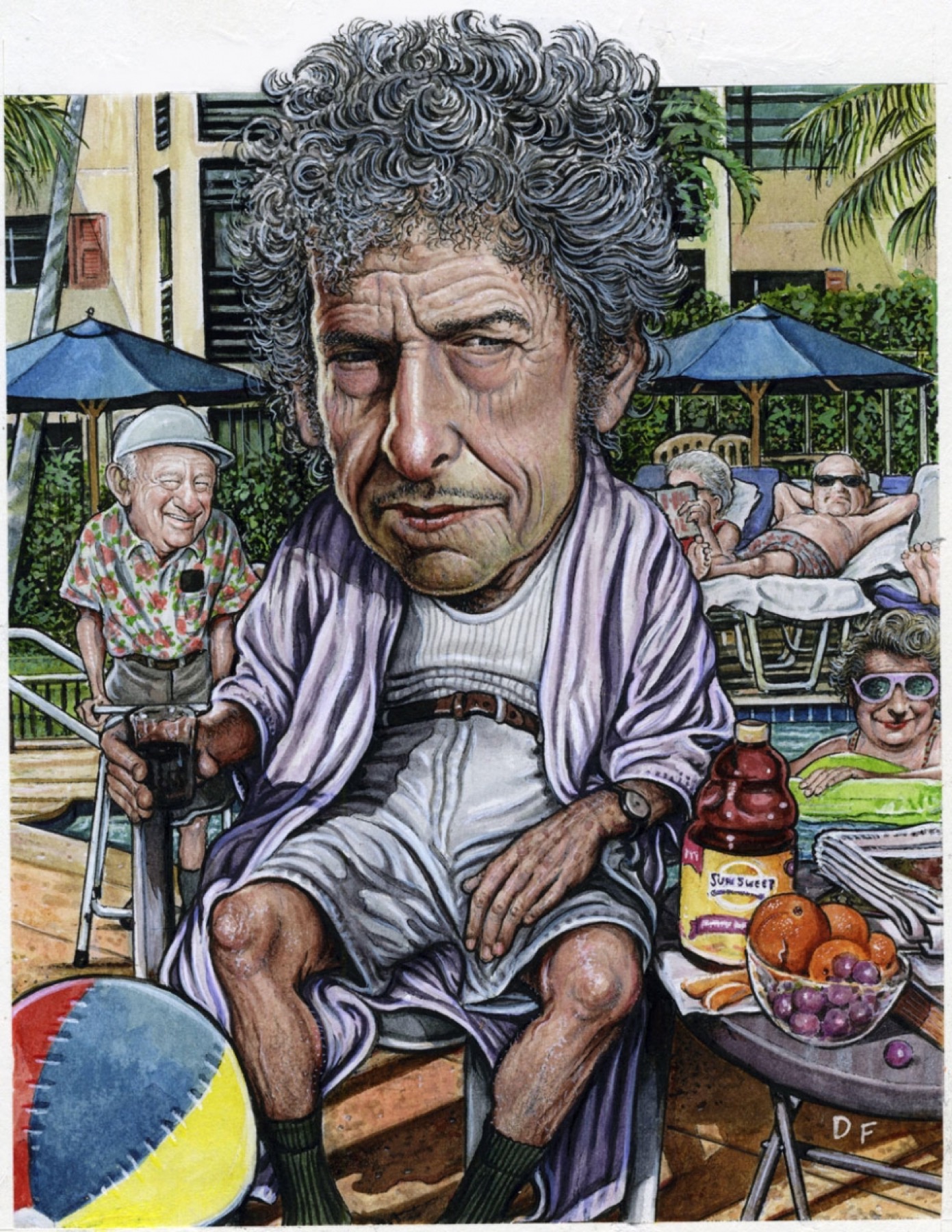
Illustration by Drew Friedman, www.drewfriedman.net. Originally published in the Wall Street Journal
BOB ON BOB
By Elizabeth Nelson
In a 2017 interview with Bill Flanagan, Bob Dylan held forth on his views regarding Don McLean’s “American Pie,” a song that I have loathed with an almost inchoate malice since first encountering it as a young child. Dylan didn’t seem like a fan either, and in particular addressed the long-standing conjecture that he himself was the so-called “jester” referred to in McLean’s bloviating marathon:
“A jester? Sure, the jester writes songs like ‘Masters of War,’ ‘A Hard Rain’s a-Gonna Fall,’ ‘It’s Alright, Ma’— some jester,” shrugged Dylan. “I have to think he’s talking about somebody else. Ask him.”
For obvious reasons, the day this was published was one of the happiest of my life. In fact, for several ensuing weeks it was all I could do not to answer every inquiry made of me with the two-word phrase: “A jester?” The only downside to this was that it broke loose in me an insatiable desire to know more. Which other songs has Dylan heard over the years and concluded they might be about him, and how would he respond? Since his emergence as a boy genius/enfant terrible in the early sixties, he has long evinced a complicated, and frequently contentious relationship to his songwriting peers. Now I envision him, hoodied-head perched against the tour bus radio, conspiratorially drawing conclusions about nearly every song he encounters.
So runs my imagination, and here are my findings. Please enjoy, and wager responsibly.
Piano Man By Billy Joel
So I’m the “piano man”? Tell me this—how is one both man and piano? What manner of creature would that be? “Sing me a song”? Like a Victrola? Hardly likely that I would do that. Maybe this writer’s misapprehension occurs from the fact that I once wrote songs on the piano that brought about an explosive new consciousness that remade the fabric of a dormant nation. Songs like “Like a Rolling Stone” and “Ballad of a Thin Man.” Maybe that’s where the confusion stems from. I couldn’t say.
Penny Lover By Lionel Richie
A one-cent paramour? Giving little and costing less? That’s a pretty rugged accusation. I wouldn’t think that would apply to an individual who wrote love songs that transcend the test of time, songs like the moving devotional pledge “She Belongs to Me” or the languid tribute “Sad Eyed Lady of the Lowlands,” which once took up an entire side of the double album Blonde on Blonde. Seems to be something off on the accounting, from where I stand.
Black Magic Woman By Santana
A “black magic woman”? What a thing to be called! As if I would get involved or remain involved in the dark arts. By no means am I a black magic woman. No matter how much time I may have spent in Haiti under mysterious circumstances. Santana is no doubt mistaken. He’s probably thinking of Graham Nash or Leo Kottke.
Aqualung By Jethro Tull
“Sitting on a park bench / eyeing little girls with bad intent”? Just because I like to sit in parks? Somehow this means you can discern my intent? You must be thinking of somebody who looks like me or something. This wouldn’t describe me at all. If anything, I read the sports page when I sit in the park. Maybe if he said, “Sitting on a park bench / eyeing the sports page / with the intent of reading the box scores.”
Hang on Sloopy By The McCoys
To say that I would be Sloopy is ridiculous. This song says: “Sloopy lives in a very bad part of town.” I’ve lived in all parts of different towns and wouldn’t necessarily say that one was worse than the other. Who’s equipped to make that sort of judgment? The Prince of Peace himself was born not in a palace but in a humble manger, surrounded by the lowborn beasts of the desert. Would that be a bad part of town? Maybe the McCoys should reconsider their scripture.
Song for Bob Dylan By David Bowie
People tell me that the “Bob Dylan” in this song is actually supposed to be me. That could hardly be true. This singer speaks of “a voice like sand and glue.” Who could have a voice like that, I wonder? A hybrid of the natural and the unnatural? I’ll tell you that I wouldn’t recognize anything like that, and if I saw it I’d go the other way. Whoever this “Bob Dylan” is, he should listen to my album Nashville Skyline, whose smooth crooning set an unprepared nation back on its heels.
Bob Dylan’s 115th Dream By Bob Dylan
115th dream? That could not be me. I wouldn’t number my dreams any more than I would measure the circumference of my consciousness. To do so would be the height of insanity. Maybe the person who authored this should know that I once wrote the lyrics “My burden is heavy / my dreams are beyond my control.” Maybe that could bring a little clarity to the situation. I will say, this is a pretty good song though. . . .
Enjoy this story? Subscribe to the Oxford American.


